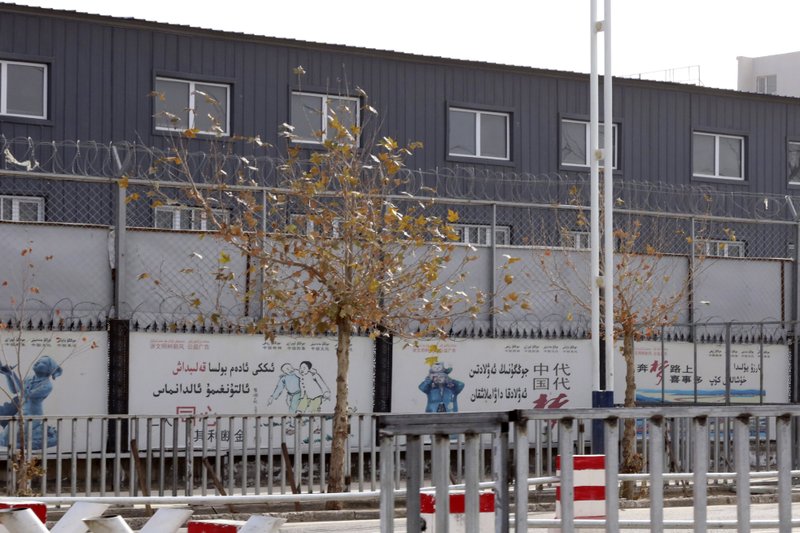President Donald Trump's administration is blocking shipments from a Chinese company making baby pajamas sold at Costco warehouses, after the foreign manufacturer was accused of forcing members of ethnic minority groups locked in an internment camp to sew clothes against their will.
The government is also blocking rubber gloves sold by industry leader Ansell, whose customers include surgeons, mechanics and scientists around the U.S., accusing a Malaysian manufacturer of staffing its factories with migrants from Bangladesh, Nepal and other countries who went into crushing debt from paying high recruitment fees. Imports of bone charcoal from Brazil that firms like Plymouth Technology and ResinTech Inc. used to remove contaminants in U.S. water systems, diamonds from Zimbabwe and gold from eastern Democratic Republic of Congo were stopped as well.
U.S. Customs and Border Protection on Oct. 1 imposed rare detention orders on goods imported from an unprecedented five countries in one day based on allegations that people producing those items might be children, or adults subjected to forced labor. The orders are used to hold shipping containers at the U.S. ports of entry until the agency can investigate claims of wrongdoing.
The customs agency did not release information about the companies that were importing the goods covered by last week's detention orders. But The Associated Press tracked items to several buyers, including Costco and the U.S. subsidiary of Ansell, an Australian protective gloves manufacturer. The companies said they were not aware that their products were being made with forced labor.
Acting Customs and Border Protection Commissioner Mark Morgan said the orders, the most issued in a single day, "shows that if we suspect a product is made using forced labor, we'll take that product off U.S. shelves."
The agency's action last week is sending ripples globally, with exporters now on notice to improve labor conditions. Domestically, some U.S. importers were shaken to learn their products might have been made by people forced to work against their will or under threat of punishment. Human-rights experts warn that as many as 25 million people globally are victims of forced labor. In recent years, investigations by media organizations and advocacy groups have tracked products suspected of being made by forced labor as they travel from manufacturers, through brokers and dealers, into the hands of American consumers.
"[The agency's] announcement is significant because of the unprecedented number of actions and for the message that it sends across corporate supply chains," said labor advocates at Humanity United and Freedom Fund in a joint statement.
Until recently, the detentions orders used to block the shipments last week would have been almost impossible.
Before 2016, the Tariff Act -- which gave Customs and Border Protection the authority to seize shipments where forced labor was suspected and to block further imports -- had been used only 39 times over its first 85 years. That was largely because of two words: "consumptive demand." In other words, if there was not sufficient supply to meet domestic demand, imports were allowed regardless of how they were produced.
After an AP investigation found that seafood caught by slaves in Southeast Asia was ending up in restaurants and markets around the U.S. with impunity because of the loophole, Congress and President Barack Obama changed the law.
Under the law, U.S. importers have 90 days to prove no forced labor was used to produce their products. If they can't, they can either ship their products to another country or surrender them to Customs.
One case from last week involves China's Hetian Taida Apparel, which AP reported last year was forcing Uighur Muslims and members of other ethnic minority groups to sew clothes for U.S. importers inside a Chinese re-education camp.
Last month, Costco Wholesale Corp. began importing baby pajamas made by the company. On September 21 and again on Sept. 26, Hetian Taida sent shipping containers filled with 100% polyester blanket sleepers for babies and toddlers to the U.S., labeled for Costco, according to shipping records.
Meanwhile in Malaysia, which supplies half of the world's medical exam and surgical gloves, government and industry officials were shaken that one of their own -- WRP Asia Pacific -- had its products detained by U.S. customs officials for allegations of forced labor.
Workers at WRP and many other rubber glove factories have been forced to pay fees as high as $5,000 in their home countries, including Bangladesh and Nepal, for jobs that don't meet their promise, said activist Andy Hall, who has advocated on behalf of Southeast Asian migrant laborers. Some of the rubber glove makers don't pay workers for months, house them in unkempt and overcrowded conditions, hold their passports so they can't leave and don't allow them to quit, he said.
WRP importers include some of the leading medical suppliers in the U.S. like global giant Ansell, as well as smaller firms like Bay Medical Company Inc. in Brisbane, Calif.
A bone charcoal manufacturer, Bonechar Carvao Ativado Ltd. in southern Brazil, said accusations leading to its U.S. customs detention order came from a competitor's unfounded smear campaign. Bone charcoal is made by workers who burn animal bones, mostly from cattle, in sealed ovens at temperatures as high as 1,292 F.
A handful of U.S. companies imported bone charcoal from the Brazilian company last year, mostly for use in water filtration, pigments and sugar refining, according to shipping records from ImportGenius. These included Plymouth Technology in Rochester Hills, Mich.; Ebonex Corp. near Detroit; ResinTech Inc. in West Berlin, N.J.; and American Charcoal Co. in Jackson, Wyo.
Information for this article was contributed by Luis Alonso, Yanan Wang, Dake Kang and Diane Jeantet of The Associated Press.
Business on 10/09/2019
